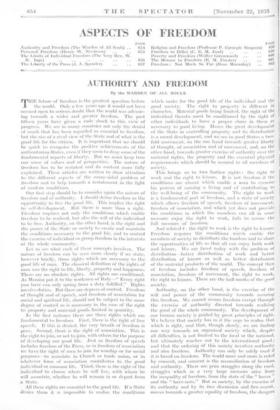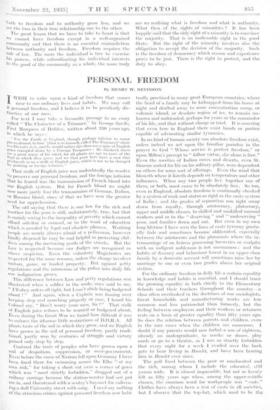AUTHORITY AND FREEDOM
By the WARDEN OF ALL SOULS THE future of freedom is the greatest question before the world. Only a few years ago it would not have seemed Open to serious doubt that the world was advanc- ing towards a wider and greater freedom. The past fifteen years have given a rude shock to this view of .progress. We see in many countries not only the denial of much that has keen regarded as essential to freedom, but the rise of a rival view of the State and of what is the good life for the-citizen. It is important that we should be quick to recognise the positive achievements of the authoritarian States, even if they seem to deny some of the fundamental aspects of liberty. But we must keep true our sense of values and of perspective. The nature of freedom has to be restated and its content more fully explained. These articles are written to draw attention to the different aspects of the many-sided problem of freedom and to help towards a restatement in the light of modern conditions.
Our first step should be to consider again the nature of freedom and of authority. I should define freedom as the opportunity to live the good life. This implies the right to self-development. But there is more than a right. Freedoin requires not only the conditions which enable freedom to be realised, but also the will of the individual to be free. Authority, on the other hand, is the right and the power of the State or society to create and maintain the conditions necessary to the good life, and to control the exercise or individual or group freedom in the interests of the whole community.
Let us see what each of these concepts involves. The nature of freedom can be seen more clearly if we state, however briefly, those rights which are necessary to the good life of man: The classical definition of the rights of man was the right to life, liberty, property and happiness. There are no absolute rights. All rights are conditional. As Mazzini put it to the workmen of Italy—" Every right you have can only spring from a duty fulfilled."' Rights involve duties. But there are degrees of control. Freedom of thought and of speech, and freedom of association for social and spiritual life, should not be subject to the same degree of control as is necessary in the case of the right to property and material goods limited in quantity.
In the first instance there are three rights which are fundamental to freedom. First, there is the right of free speech. If this is denied, the very breath of freedom is gone. Second, there is the right of association. This is the right to join, or not to join, with others for the purpose of developing our good life. Just as freedom of speech includes freedom of the Press, so in freedom of association we have the right of men to join for worship or for social purposes --to associate in Church or trade union, or in whatever form of association contributes to the good individual or common life. Third, there is the right of the individual to chooSe where he will live, with whom he will associate, whether he will remain in or depart from a State.
All theSe rights are essential to-the good life. If a State denies them it is impossible to • realise the conditions. which make for the good life of the individual and the good society. The right to property is different in character. Material goods being limited, the right of the individual thereto must be conditioned by the right of other individuals to have a proper share in them as necessary to good living. Hence the great development of the State in controlling property and its distribution is a moral development, and we see in good States a two- fold movement, on the one hand towards greater liberty of thought, of association and of movement, and, on the other hand, towards' greater exercise of authority over the material rights, the property and the essential physical requirements which should be secured to all members of society.
This brings us' to two further rights : the right to work and the right to leisure. It is not freedom if the conditions are absent which enable a /Alan to exercise his powers of earning a living and of contributing to the well-being Of the community. The right to work is a fundamental part of freedom, and a state of•society which allows freedom of speech, freedom of movement, freedom of association, and which yet does not provide the conditiOns in which the members can all in sonic measure enjoy the right to Work, •fails•• to 'secure the full measure of freedom.
And related t, the right to work is the right to leisure. Freedom requires the conditions which enable the members of society to distribute the burdens and to shore the opportunities of life so that all can enjoy both work and leisure. We are faced today with the problem of distribution—better distribution of work and better distribution of leisure as well as better distribution of the material products of the world. The concept then of freedom includes freedom of speech, freedom . of association, freedom of movement, the right to work, the right to leisure. These are the hall-marks of the good society.
Authority, on the other hand, is the exercise of the will and power of the community towards securing this freedom: We cannot secure freedom except through the exercise of authority directed towards realiSing the good of the whole community. The development of our human society is guided by great principles of right. We believe that society has in it the urge to realise that which is right, and that, though slowly, we are finding our way towards an organised society winch, despite all difficulties, is not limited to the local or the national, but ultimately readies out to the international good ; and that the ordering of this society involves authority and also freedom. Authority can only be safely used if it is based on freedom. The world more and more is ruled by consent, and consent is the reconciliation of freedom and authority. There are grim struggles along the road, struggles which in a very large measure arise from the inequality of freedom, from the state of the " haves and the " have-nots." But as society, by the exercise .of its authority and by its free discussion and free 'assent, moves towards a' greater equality of freedom, the dangers both to freedom and to authority grow less, and we see the two in their true relationship one to the other.
The great lesson that we have to take' to heart is that we cannot have freedom except in a well-organised community and that there is no essential contradiction between authority and freedoM. Freedom requires the rule of jaw. The more the individual is free to exercise lus powers, while subordinating his individual interests to the good of the community as a whole, the more truly are we realising what is freedom and what is authority. What then of the rights of minorities ? It has been happilYSaid that the only right of a minority is to convince the majority. That is an inalienable right in the good State. But the right of the minority involves also the obligation to accept the decision of the majority. 'Stich is the freedom of democracy which reason and experience prove to be just. There is the right to protest, and the duty to obey.































































































 Previous page
Previous page